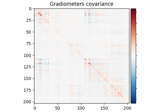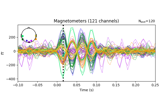mne.compute_rank#
- mne.compute_rank(inst, rank=None, scalings=None, info=None, tol='auto', *, proj=True, tol_kind='absolute', on_rank_mismatch='ignore', on_few_samples=None, verbose=None)[source]#
Compute the rank of data or noise covariance.
This function will normalize the rows of the data (typically channels or vertices) such that non-zero singular values should be close to one. It operates on data channels only.
- Parameters:
- instinstance of
Raw,Epochs, orCovariance Raw measurements to compute the rank from or the covariance.
- rank
None| ‘info’ | ‘full’ |dict This controls the rank computation that can be read from the measurement info or estimated from the data. When a noise covariance is used for whitening, this should reflect the rank of that covariance, otherwise amplification of noise components can occur in whitening (e.g., often during source localization).
NoneThe rank will be estimated from the data after proper scaling of different channel types.
'info'The rank is inferred from
info. If data have been processed with Maxwell filtering, the Maxwell filtering header is used. Otherwise, the channel counts themselves are used. In both cases, the number of projectors is subtracted from the (effective) number of channels in the data. For example, if Maxwell filtering reduces the rank to 68, with two projectors the returned value will be 66.'full'The rank is assumed to be full, i.e. equal to the number of good channels. If a
Covarianceis passed, this can make sense if it has been (possibly improperly) regularized without taking into account the true data rank.dictCalculate the rank only for a subset of channel types, and explicitly specify the rank for the remaining channel types. This can be extremely useful if you already know the rank of (part of) your data, for instance in case you have calculated it earlier.
This parameter must be a dictionary whose keys correspond to channel types in the data (e.g.
'meg','mag','grad','eeg'), and whose values are integers representing the respective ranks. For example,{'mag': 90, 'eeg': 45}will assume a rank of90and45for magnetometer data and EEG data, respectively.The ranks for all channel types present in the data, but not specified in the dictionary will be estimated empirically. That is, if you passed a dataset containing magnetometer, gradiometer, and EEG data together with the dictionary from the previous example, only the gradiometer rank would be determined, while the specified magnetometer and EEG ranks would be taken for granted.
The default is
None.- scalings
dict|None(defaultNone) Defaults to
dict(mag=1e15, grad=1e13, eeg=1e6). These defaults will scale different channel types to comparable values.- info
mne.Info|None The
mne.Infoobject with information about the sensors and methods of measurement. Only necessary ifinstis amne.Covarianceobject (since this does not provideinst.info).- tol
float| ‘auto’ Tolerance for singular values to consider non-zero in calculating the rank. The singular values are calculated in this method such that independent data are expected to have singular value around one. Can be ‘auto’ to use the same thresholding as
scipy.linalg.orth().- projbool
If True, all projs in
instandinfowill be applied or considered whenrank=Noneorrank='info'.- tol_kind
str Can be: “absolute” (default) or “relative”. Only used if
tolis a float, because whentolis a string the mode is implicitly relative. After applying the chosen scale factors / normalization to the data, the singular values are computed, and the rank is then taken as:'absolute'The number of singular values
sgreater thantol. This mode can fail if your data do not adhere to typical data scalings.
'relative'The number of singular values
sgreater thantol * s.max(). This mode can fail if you have one or more large components in the data (e.g., artifacts).
New in v0.21.0.
- on_rank_mismatch
str If an explicit MEG value is passed, what to do when it does not match an empirically computed rank (only used for covariances). Can be ‘raise’ to raise an error, ‘warn’ (default) to emit a warning, or ‘ignore’ to ignore.
New in v0.23.
- on_few_samples
str|None Can be ‘warn’, ‘ignore’, or ‘raise’ to control behavior when there are fewer samples than channels, which can lead to inaccurate rank estimates. None (default) means “ignore” if
instis amne.Covarianceorrank in ("info", "full"), and “warn” otherwise.New in v1.11.
- verbosebool |
str|int|None Control verbosity of the logging output. If
None, use the default verbosity level. See the logging documentation andmne.verbose()for details. Should only be passed as a keyword argument.
- instinstance of
- Returns:
- rank
dict Estimated rank of the data for each channel type. To get the total rank, you can use
sum(rank.values()).
- rank
Notes
New in v0.18.
Examples using mne.compute_rank#

Compute evoked ERS source power using DICS, LCMV beamformer, and dSPM
